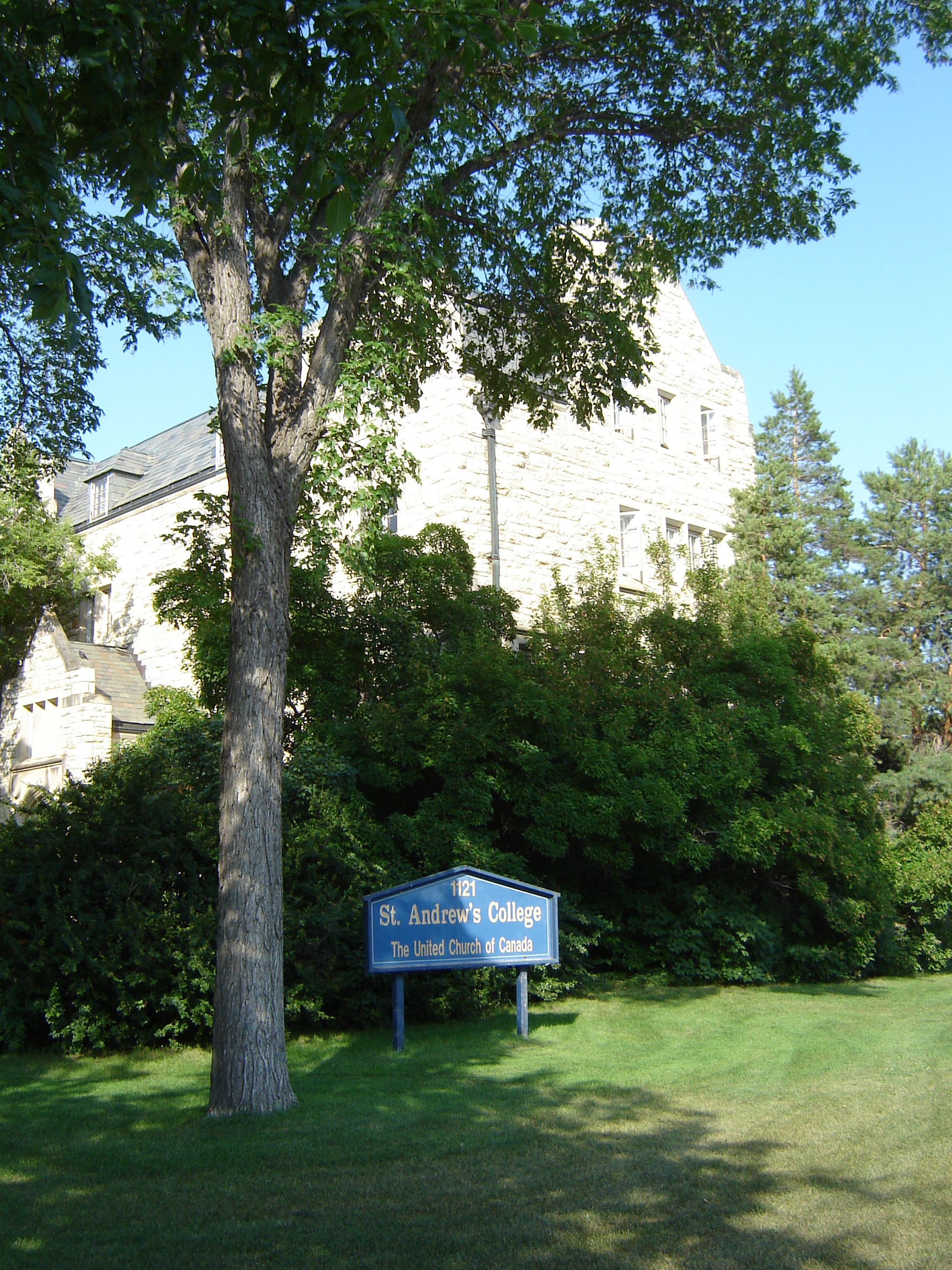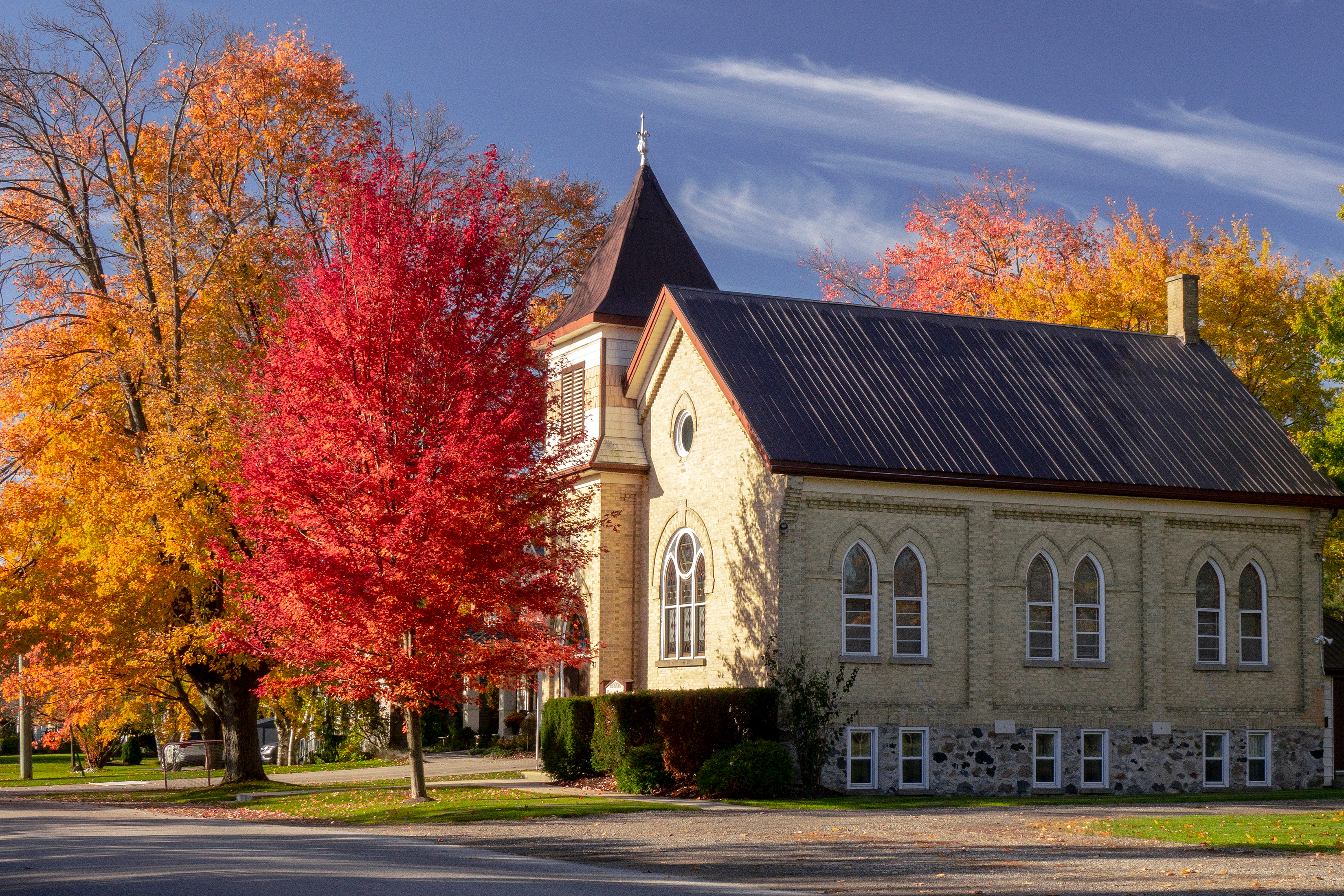|
St. Andrew's College, Saskatoon
St. Andrew’s College, formerly the Presbyterian Theological College, is a degree-granting, accredited theologically ecumenical seminary of the United Church of Canada. It is located in Saskatoon, Saskatchewan, and was the second affiliated college of the University of Saskatchewan. Along with the College of Emmanuel and St. Chad (Anglican Church of Canada), and the Lutheran Theological Seminary, Saskatoon (Evangelical Lutheran Church in Canada The Evangelical Lutheran Church in Canada (ELCIC; french: Église évangélique luthérienne au Canada) is Canada's largest Lutheran denomination, with 95,000 baptized members in 519 congregations, with the second largest, the Lutheran Church–C ...), it makes up the Saskatoon Theological Union (STU). History The Presbyterian Theological College was founded in 1912 and confirmed by an Act of the Saskatchewan Legislature in 1913. That same year, Edmund H. Oliver began his tenure as the first principal of the college, appointed ... [...More Info...] [...Related Items...] OR: [Wikipedia] [Google] [Baidu] |
United Church Of Canada
The United Church of Canada (french: link=no, Église unie du Canada) is a mainline Protestant denomination that is the largest Protestant Christian denomination in Canada and the second largest Canadian Christian denomination after the Catholic Church in Canada. The United Church was founded in 1925 as a merger of four Protestant denominations with a total combined membership of about 600,000 members: the Methodist Church, Canada, the Congregational Union of Ontario and Quebec, two-thirds of the congregations of the Presbyterian Church in Canada, and the Association of Local Union Churches, a movement predominantly of the Canadian Prairie provinces. The Canadian Conference of the Evangelical United Brethren Church joined the United Church of Canada on January 1, 1968. Membership peaked in 1964 at 1.1 million and has declined since that time. From 1991 to 2001, the number of people claiming an affiliation with the United Church decreased by 8%, the third largest decreas ... [...More Info...] [...Related Items...] OR: [Wikipedia] [Google] [Baidu] |
New Canadians
According to the 2021 Canadian census, immigrants in Canada number 8.3 million persons and make up approximately 23 percent of Canada's total population. This represents the eighth-largest immigrant population in the world, while the proportion represents one of the highest ratios for industrialized Western countries. Following Canada's confederation in 1867, immigration played an integral role in helping develop vast tracts of land.Cheatham, Amelia. 2020 August 3.What Is Canada's Immigration Policy? ''Council on Foreign Relations''. During this era, the Canadian Government would sponsor information campaigns and recruiters to encourage settlement in rural areas; however, this would primarily be only towards those of European and Christian backgrounds, while others—particularly Buddhist, Shinto, Sikh, Muslim, and Jewish immigrants—as well as the poor, ill, and disabled, would be less than welcome.Belshaw, John Douglas. 2016.Post-War Immigration" Ch. 5 §11 in ''Ca ... [...More Info...] [...Related Items...] OR: [Wikipedia] [Google] [Baidu] |
Seminaries And Theological Colleges In Canada
A seminary, school of theology, theological seminary, or divinity school is an educational institution for educating students (sometimes called ''seminarians'') in scripture, theology, generally to prepare them for ordination to serve as clergy, in academics, or mostly in Christian ministry. The English word is taken from the Latin ''seminarium'', translated as ''seed-bed'', an image taken from the Council of Trent document ''Cum adolescentium aetas'' which called for the first modern seminaries. In the United States, the term is currently used for graduate-level theological institutions, but historically it was used for high schools. History The establishment of seminaries in modern times resulted from Roman Catholic reforms of the Counter-Reformation after the Council of Trent. These Tridentine seminaries placed great emphasis on spiritual formation and personal discipline as well as the study, first of philosophy as a base, and, then, as the final crown, theology. The oldest ... [...More Info...] [...Related Items...] OR: [Wikipedia] [Google] [Baidu] |
Affirm United
Affirmation or affirm may refer to: Logic * Affirmation, a declaration that something is true * In logic, the union of the subject and predicate of a proposition Law * Affirmation (law), a declaration made by and allowed to those who conscientiously object to taking an oath * Affirmed in law, means that a decision has been reviewed and found valid Business * Affirm (company), a financial technology company Psychology * Self-affirmation, the psychological process of re-affirming personal values to protect self-identity * Affirmations (New Age), the practice of positive thinking in New Age terminology * Affirmative prayer, a form of prayer that focuses on a positive outcome * Nietzschean affirmation, a philosophical concept according to which we create meaning and knowledge for ourselves in a nihilistic world Organisations * Affirmation: Gay & Lesbian Mormons, an international Mormon organisation * Affirmation Scotland, an LGBT group within the Church of Scotland * Affirmations ... [...More Info...] [...Related Items...] OR: [Wikipedia] [Google] [Baidu] |
Wilfrid Laurier University Press
Wilfrid Laurier University Press, based in Waterloo, Ontario, is a publisher of scholarly writing and is part of Wilfrid Laurier University. The fourth-largest university press in Canada, WLUP publishes work in a variety of disciplines in the humanities and social sciences — literary criticism, indigenous studies, sociology, environmental studies, and history among them — as well as books of regional interest. Laurier Press also provides publishing services to scholarly associations and journals. History The Press was founded in 1974 as a non-profit enterprise. They publish 20-25 titles per year and have 800 physical titles in print and digital formats. WLUP has been typesetting books from electronic files since 1984, and was one of the first publishers to have a web presence in 1994. Wilfrid Laurier University Press distributes titles for the Laurier Centre for Military, Strategic and Disarmament Studies, Toronto International Film Festival (in Canada) and the Cress Board ... [...More Info...] [...Related Items...] OR: [Wikipedia] [Google] [Baidu] |
Canada In World War II
The history of Canada during World War II begins with the German invasion of Poland on 1 September 1939. While the Canadian Armed Forces were eventually active in nearly every theatre of war, most combat was centred in Italy, Northwestern Europe, and the North Atlantic. In all, some 1.1 million Canadians served in the Canadian Army, Royal Canadian Navy, Royal Canadian Air Force, and in forces across the empire, with approximately 42,000 killed and another 55,000 wounded. During the war, Canada was subject to direct attack in the Battle of the St. Lawrence, and in the shelling of a lighthouse at Estevan Point in British Columbia. The financial cost was $21.8 billion between 1939 and 1950. By the end of the war Canada had the world's fourth largest air force, and third largest navy. The Canadian Merchant Navy completed over 25,000 voyages across the Atlantic, 130,000 Allied pilots were trained in Canada in the British Commonwealth Air Training Plan. On D-Day, 6 June 1944 the 3r ... [...More Info...] [...Related Items...] OR: [Wikipedia] [Google] [Baidu] |
Conscientious Objectors
A conscientious objector (often shortened to conchie) is an "individual who has claimed the right to refuse to perform military service" on the grounds of freedom of thought, conscience, or religion. The term has also been extended to objecting to working for the military–industrial complex due to a crisis of conscience. In some countries, conscientious objectors are assigned to an alternative civilian service as a substitute for conscription or military service. A number of organizations around the world celebrate the principle on May 15 as International Conscientious Objection Day. On March 8, 1995, the United Nations Commission on Human Rights resolution 1995/83 stated that "persons performing military service should not be excluded from the right to have conscientious objections to military service". This was re-affirmed on April 22, 1998, when resolution 1998/77 recognized that "persons lreadyperforming military service may ''develop'' conscientious objections". H ... [...More Info...] [...Related Items...] OR: [Wikipedia] [Google] [Baidu] |
Lydia Emelie Gruchy
Lydia Emelie Gruchy (September 5, 1894 – April 9, 1992) was a French-born Canadian who became the first woman ordained to the ministry of the United Church of Canada. She was the first woman to enroll in theological studies, to graduate from a Presbyterian theological college and also the first woman to be granted an honorary Doctor of Divinity degree in Canada. Early life Lydia Emelie Gruchy was born on 5 September 1894 in Asnières-sur-Seine, Paris, France to Mary Ann (née Hicks) and Charles Herbert de Gruchy from the Island of Jersey, in the Channel Islands. She grew up in France and England, and in 1913, immigrated with her family to Strasbourg, Saskatchewan. Career She began teaching in schools around Strasbourg and attended Nutana Collegiate, which at the time housed the Saskatoon Normal School, earning her teaching certificate. She soon followed a brother to the University of Saskatchewan and graduated with honors in 1920 with her bachelor's degree. With the encouragem ... [...More Info...] [...Related Items...] OR: [Wikipedia] [Google] [Baidu] |
George H
George may refer to: People * George (given name) * George (surname) * George (singer), American-Canadian singer George Nozuka, known by the mononym George * George Washington, First President of the United States * George W. Bush, 43rd President of the United States * George H. W. Bush, 41st President of the United States * George V, King of Great Britain, Ireland, the British Dominions and Emperor of India from 1910-1936 * George VI, King of Great Britain, Ireland, the British Dominions and Emperor of India from 1936-1952 * Prince George of Wales * George Papagheorghe also known as Jorge / GEØRGE * George, stage name of Giorgio Moroder * George Harrison, an English musician and singer-songwriter Places South Africa * George, Western Cape ** George Airport United States * George, Iowa * George, Missouri * George, Washington * George County, Mississippi * George Air Force Base, a former U.S. Air Force base located in California Characters * George (Peppa Pig), a 2- ... [...More Info...] [...Related Items...] OR: [Wikipedia] [Google] [Baidu] |
Presbyterian Church In Canada
The Presbyterian Church in Canada (french: Église presbytérienne du Canada) is a Presbyterian denomination, serving in Canada under this name since 1875. The United Church of Canada claimed the right to the name from 1925 to 1939. According to the Canada 2001 Census 409,830 Canadians identify themselves as Presbyterian, that is, 1.4 percent of the population. The Canadian roots of the Presbyterian Church in Canada can be traced to both Scottish settlers and French Huguenots, and the first Presbyterian churches formed in the late 16th and early 17th centuries, following such European Protestant Reformation theologians as John Calvin and John Knox. Once the largest Christian denomination in English-speaking Canada, in 1925 some 70 percent of its congregations joined with the Methodist Church, Canada and the Congregational Union of Ontario and Quebec to form the ''United Church of Canada''. The terms ''Continuing Presbyterians'' and ''Non-Concurring Presbyterians'' were then us ... [...More Info...] [...Related Items...] OR: [Wikipedia] [Google] [Baidu] |
Saskatoon Theological Union
The Saskatoon Theologican Union is an alliance of three Protestant theological colleges at the University of Saskatchewan. * College of Emmanuel and St. Chad (Anglican Church of Canada) * Lutheran Theological Seminary, Saskatoon (Evangelical Lutheran Church in Canada) * St. Andrew's College, Saskatoon, St. Andrew's College (United Church of Canada) There is a Roman Catholic college at the university, St. Thomas More College, which is not a member of the union. External links * College of Emmanuel and St. ChadLutheran Theological Seminary, SaskatoonSt. Andrew's College, Saskatoon Seminaries and theological colleges in Canada, Saskatoon Theological Union {{Seminary-stub ... [...More Info...] [...Related Items...] OR: [Wikipedia] [Google] [Baidu] |





